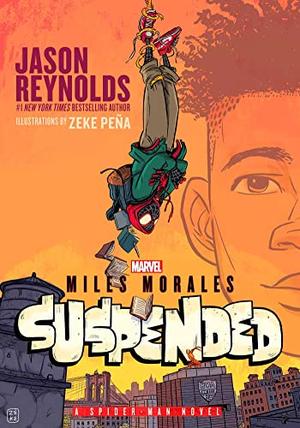Jason Reynolds’ recent novel Miles Morales Suspended is a genre-bending book written in both prose and verse. It is also a sequel to Miles Morales: Spider-Man (2017). In typical Reynolds fashion, readers are invited to think about some deep topics, this time related to identity. Although we all aren’t able to transform into Spider Man like Peter Parker or Miles can, readers who think metaphorically can use their spidey-sense to detect layers of applicable meaning.
A Puerto Rican mixed race student Miles Morales attends Brooklyn Visions Academy. Despite the school’s motto: “Vision is at the center of all we do,” some of the policies and instructors reflect narrowmindedness. Miles is determined to do something about this lack of vision.
After challenging his history teacher, Miles receives in-school suspension. Reynolds takes readers on a journey through that day in ISS. Although Miles’s parents express pride in their son for standing up for what is right, Miles still worries that he has disappointed them. Miles’s father is fond of hopping onto the line “Darkness cannot drive out darkness; only light can do that” by Martin Luther King, Junior with his own advice: “Gotta be that light. And if you can’t be it, find it, and it’ll lift your chin. No looking down. Ever” (98).
For many of us, survival requires superpowers. We have to keep our antenna up, ready to sense anything that feels weird or out of place. Whether a person calls such detection a gut instinct, intuition, or a feeling, we pay attention so that we can be proactive rather than reactive.
Still, Miles hates the word, superpowers. Mrs. Khalil’s chemistry class makes Miles think about how, “because of the genetically altered spider bite, his body had extra chemical, not super chemicals, which meant he was extra human, not necessarily superhuman” (135). Furthermore, Miles isn’t even sure he should be called a hero when he can’t even save himself. Eventually, he accepts the paradoxical truth that part of being a hero is believing you are hero material and another part is never seeing yourself as a hero.
Just as a tiny spider changes his life forever or puberty changes a body forever, Miles comes to believe that small things have the power to change the course of reality. Like Gregor Samsa in Franz Kafka’s short story “The Metamorphosis,” sometimes, we simply wake up to a brand-new world or an alternate way of being in the world. Sometimes the rules seem to change overnight, creating confusion or chaos or misunderstanding. “Sometimes we erase things to create new meaning in what once was. Other times we erase things to be demeaning to what once was, . . . or we hold up someone else’s directions and crease [our] throats and throw away something [we] love” (210-211).
Reynolds extends and layers his metaphors until we come to know that if something “turns or tarnishes, it ain’t real” (241).
- Posted by Donna

